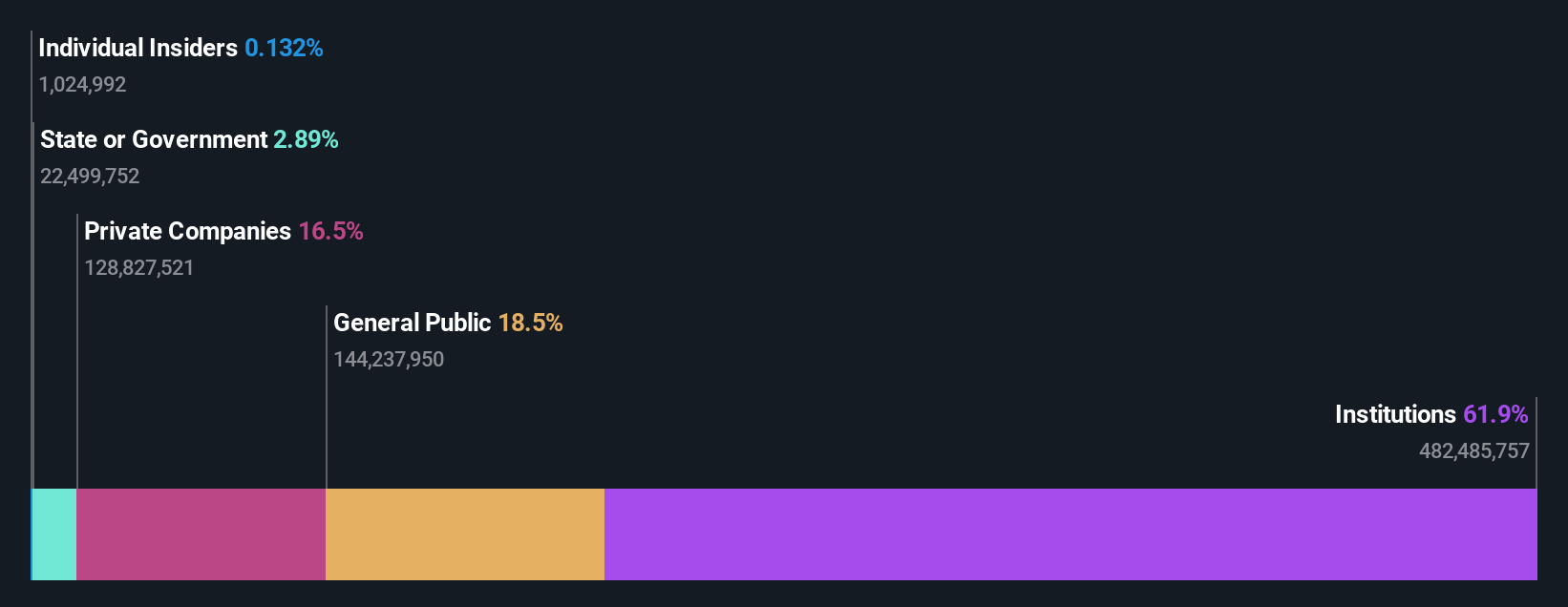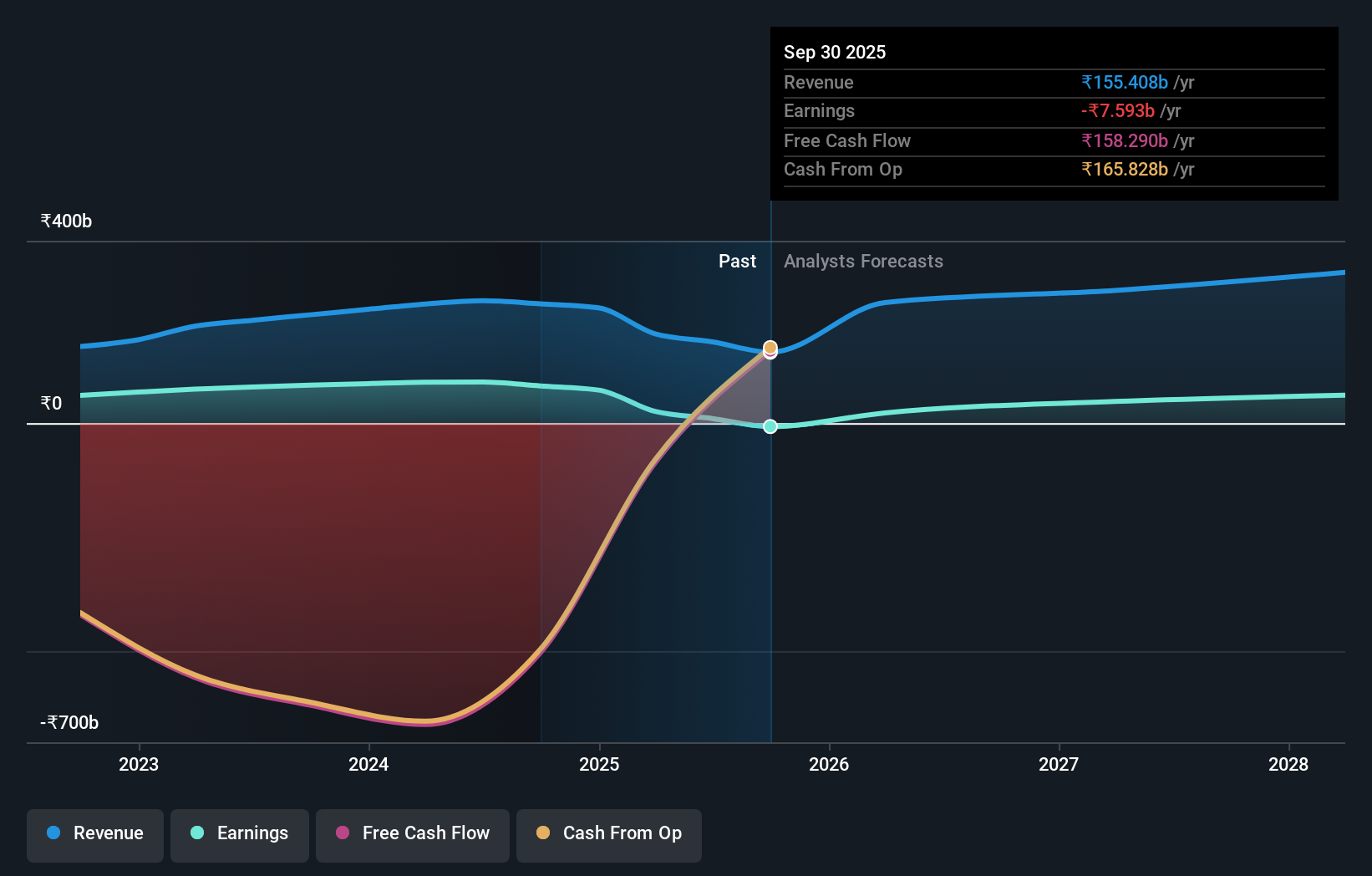Positive week for IndusInd Bank Limited (NSE:INDUSINDBK) institutional investors who lost 17% over the past year
Key Insights
- Given the large stake in the stock by institutions, IndusInd Bank's stock price might be vulnerable to their trading decisions
- The top 13 shareholders own 51% of the company
- Analyst forecasts along with ownership data serve to give a strong idea about prospects for a business
Every investor in IndusInd Bank Limited (NSE:INDUSINDBK) should be aware of the most powerful shareholder groups. And the group that holds the biggest piece of the pie are institutions with 62% ownership. In other words, the group stands to gain the most (or lose the most) from their investment into the company.
Institutional investors would probably welcome last week's 6.4% increase in the share price after a year of 17% losses as a sign that returns may to begin trending higher.
In the chart below, we zoom in on the different ownership groups of IndusInd Bank.
View our latest analysis for IndusInd Bank

What Does The Institutional Ownership Tell Us About IndusInd Bank?
Many institutions measure their performance against an index that approximates the local market. So they usually pay more attention to companies that are included in major indices.
As you can see, institutional investors have a fair amount of stake in IndusInd Bank. This can indicate that the company has a certain degree of credibility in the investment community. However, it is best to be wary of relying on the supposed validation that comes with institutional investors. They too, get it wrong sometimes. It is not uncommon to see a big share price drop if two large institutional investors try to sell out of a stock at the same time. So it is worth checking the past earnings trajectory of IndusInd Bank, (below). Of course, keep in mind that there are other factors to consider, too.

Since institutional investors own more than half the issued stock, the board will likely have to pay attention to their preferences. We note that hedge funds don't have a meaningful investment in IndusInd Bank. IndusInd International Holdings Ltd. is currently the largest shareholder, with 11% of shares outstanding. With 5.2% and 4.9% of the shares outstanding respectively, ICICI Prudential Asset Management Company Limited and Life Insurance Corporation of India are the second and third largest shareholders.
A closer look at our ownership figures suggests that the top 13 shareholders have a combined ownership of 51% implying that no single shareholder has a majority.
Researching institutional ownership is a good way to gauge and filter a stock's expected performance. The same can be achieved by studying analyst sentiments. Quite a few analysts cover the stock, so you could look into forecast growth quite easily.
Insider Ownership Of IndusInd Bank
The definition of company insiders can be subjective and does vary between jurisdictions. Our data reflects individual insiders, capturing board members at the very least. Company management run the business, but the CEO will answer to the board, even if he or she is a member of it.
Most consider insider ownership a positive because it can indicate the board is well aligned with other shareholders. However, on some occasions too much power is concentrated within this group.
Our most recent data indicates that insiders own less than 1% of IndusInd Bank Limited. But they may have an indirect interest through a corporate structure that we haven't picked up on. Keep in mind that it's a big company, and the insiders own ₹869m worth of shares. The absolute value might be more important than the proportional share. Arguably, recent buying and selling is just as important to consider. You can click here to see if insiders have been buying or selling.
General Public Ownership
The general public, who are usually individual investors, hold a 19% stake in IndusInd Bank. While this size of ownership may not be enough to sway a policy decision in their favour, they can still make a collective impact on company policies.
Private Company Ownership
We can see that Private Companies own 17%, of the shares on issue. It's hard to draw any conclusions from this fact alone, so its worth looking into who owns those private companies. Sometimes insiders or other related parties have an interest in shares in a public company through a separate private company.
Next Steps:
While it is well worth considering the different groups that own a company, there are other factors that are even more important.
I always like to check for a history of revenue growth. You can too, by accessing this free chart of historic revenue and earnings in this detailed graph.
If you are like me, you may want to think about whether this company will grow or shrink. Luckily, you can check this free report showing analyst forecasts for its future.
NB: Figures in this article are calculated using data from the last twelve months, which refer to the 12-month period ending on the last date of the month the financial statement is dated. This may not be consistent with full year annual report figures.
New: AI Stock Screener & Alerts
Our new AI Stock Screener scans the market every day to uncover opportunities.
• Dividend Powerhouses (3%+ Yield)
• Undervalued Small Caps with Insider Buying
• High growth Tech and AI Companies
Or build your own from over 50 metrics.
Have feedback on this article? Concerned about the content? Get in touch with us directly. Alternatively, email editorial-team (at) simplywallst.com.
This article by Simply Wall St is general in nature. We provide commentary based on historical data and analyst forecasts only using an unbiased methodology and our articles are not intended to be financial advice. It does not constitute a recommendation to buy or sell any stock, and does not take account of your objectives, or your financial situation. We aim to bring you long-term focused analysis driven by fundamental data. Note that our analysis may not factor in the latest price-sensitive company announcements or qualitative material. Simply Wall St has no position in any stocks mentioned.
About NSEI:INDUSINDBK
IndusInd Bank
Provides various banking products and financial services to individuals, corporations, government entities, and public sector undertakings in India.
High growth potential with adequate balance sheet.
Similar Companies
Market Insights
Community Narratives




